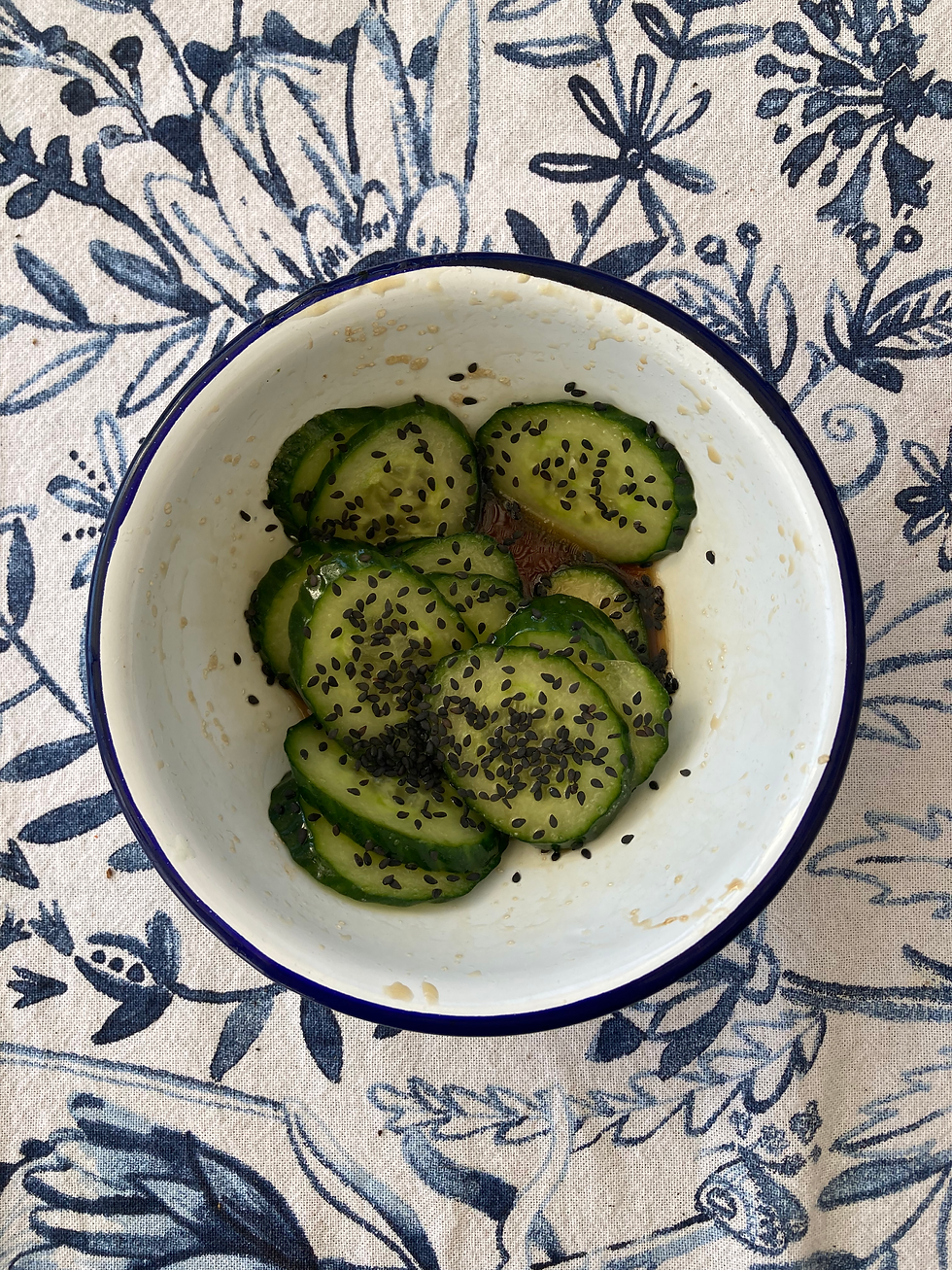Spicy Korean Quick Pickle Recipe
- miainza
- Aug 1, 2022
- 4 min read
Updated: Aug 8, 2022
I love a good pickle. I used to buy them so often that our kitchen shelves were burdened with what felt like hundreds of cleaned-out pickle jars that I swore I would reuse for something else. Well, when I learned how easy it is to pickle at home, I reused them for my homemade pickles!
When I eat a pickle, I'm looking for something mouth-puckering. The kind of salty-sweet-zingy combination that brings a bright, acidic complement to savoury dishes. Have you watched Salt, Fat, Acid, Heat on Netflix yet? This lovely series follows chef and writer Samin Nosrat as she explains the four tenets of a balanced dish by visiting four different culinary regions in the world. I watched it when it came out a few years ago, and it changed the way I thought about the flavours I was using in my cooking.
What I'm getting at is that pickles are a humble, oft-overlooked source of acid which can bring a dish to life. Pickled red cabbage is a gorgeous addition to a Mediterranean mezze or falafel wraps. I personally can't eat a Vietnamese banh mi without pickled carrot matchsticks. And these spicy Korean quick pickles are an essential complement to any home fusion cooking.
Spicy Korean cucumber pickles, or oi muchim, are typically eaten as a side dish (banchan) with Korean barbecue. I find that they go extremely well with just about any dish that calls for a pop of acid, which is why I'm calling them "Korean quick pickles" in this recipe instead.
First, a note on "quick pickles". If you don't want to boil up a pickling solution that will perfume your kitchen with the pungent stench of vinegar for days on end, quick pickles are the solution. They're also great for people like me, who are chronically and incurably impatient. Finally, if you are creative and interesting at parties, you can call them "quickles". Here's how to make 'em quick and satisfy that pickle craving without delay!
What you'll need to make quick pickles
These pickles are infused with Korean flavour, but that doesn't mean that you can't use them in a variety of dishes! I think that these pickles go just as well with kimbap as they do with lovely parma ham and white cheddar sandwich.
Ingredients
A whole cucumber
About two tablespoons of fine-grain salt, like Cerebos
Two(?) teaspoons of sesame seed oil
One tablespoon of gochugaru, a Korean chili powder available from most Asian grocery stores. I've also made these pickles with gochujang, which is a salty gochugaru and fermented soybean paste (it's a pantry staple for me!)
Two tablespoons of sugar (I use brown because I prefer the flavour, though white sugar will dissolve more easily)
Three(ish) tablespoons of rice wine vinegar
Toasted sesame seeds
Optional: about three teaspoons of mirin (rice wine)
Equipment
A bowl
A colander
A bit of kitchen paper towel
A sterilised jar
Once you've set up your mise en place (that's a fancy way of saying "prepping your kak"), all you need to do is stick to my quick pickle tricks.
How to make spicy Korean quick pickles
There are three major wins to this recipe. 1) No stinky kitchen. 1) No 24-hour minimum wait time. 3) They are absolutely delicious.
Step 1:
Slice your cucumbers on a bias with a sharp knife so that you land up with thinly sliced ovals. There's no technical advantage to having oval slices, I just think they look sexier.

Step 2:
Coat your cucumber slices generously with salt and leave them in your colander. I like a really briny, tangy pickle, so I tend to go overboard with the salt. It's really up to personal taste!
The Korean method of pickling involves salting the cucumber first to draw out some of the moisture in there. I've read that it makes the pickles crunchier. I believe it - salting my cucumbers first has produced the crunchiest, most delicious pickles I've ever eaten!
Step 3:
Let your salted cucumbers sit for 30 minutes to an hour. Honestly, I don't time this bit. The pickles are done salting when I'm too hungry to keep waiting.

When you've decided that your cucumbers have sweated it out enough, dab them dry with your bit of kitchen roll.
Step 4:
Toss your cucumbers with the rest of your ingredients in a bowl. The rice wine vinegar's acid will help dissolve the salt and sugar without heat.
You might have noticed from the ingredients list that I'm a little loosey-goosey with the measurements. That's my personal cooking style (read: chaotic, prone to panic-inducing mishaps), but it's also written that way to allow for flexibility. Like all cooking, pickling is about personal taste. If you like your pickles sweet, add more sugar. If you like them brinier, get a little heavy-handed with the salt and vinegar. If you're a hothead, spoon more chilli into the mix!

Traditionally, these cucumber pickles are only served with enough liquid to make them something of a well-seasoned cucumber salad. I prefer to produce quite a bit more liquid so that I can store them in the fridge for lunch the next day.
Conclusion
As a pickle fanatic, these are some of my favourites to make (and eat). The sesame oil lends a beautiful nuttiness to the spicy, lip-smacking pickling brine, and the cucumbers always turn out crunchy - even the next day! Enjoy it with everything from breakfast (scrambled egg and a Bloody Mary, anyone?) to dinner (hotdogs, hamburgers, fried rice, lamb koftas, egg-fried rice...you're getting the gist, right? These also pair beautifully in a sarmie with my Foolproof Homemade Mayoannise. Just saying.)





Comments